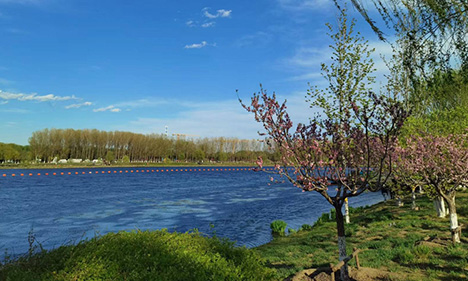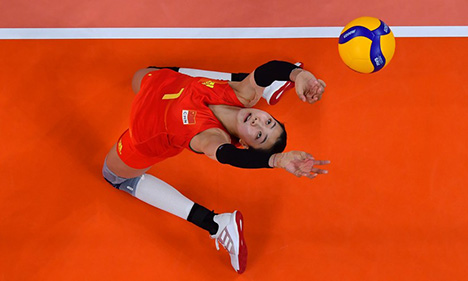Commentary: NATO’s eastward expansion is root cause of Europe’s tragic security situation
Since the Russia-Ukraine conflict broke out, the whole Western world has been in high spirits by sharing in a hatred toward one common enemy and by rejuvenating their alliance. A “Global NATO” and the Indo-Pacific version of NATO have both become heated topics of discussion. NATO, which was described as “experiencing a brain death” by French President Emmanuel Macron three years ago, seems to have found a magical cure for its rejuvenation. Is this really the case?
Only by looking retrospectively back on U.S.-Russia-Europe relations and the history of the eastward expansion of NATO after the end of the Cold War can we find the root cause of the current European security crisis and have a correct grasp of the security situation for Europe and the wider world in the future.
Currently, Europe is being disturbed by both a Cold War and a hot war, with its economy being severely impacted by sanctions and its security facing the grimmest challenge since World War II. Even after the end of the Russia-Ukraine conflict, the security situation in Europe will hardly be positive.
Although Europe has undergone several crises over the past 30 years, the current situation there is just too severe for most politicians and scholars to have expected. The expansion of NATO to a historic high level has reduced the overall security of Europe to the lowest level in its history.
There is a Chinese saying that goes “It takes more than one cold day for the river to freeze three feet deep.” In this respect, U.S.-Russia-Europe relations have not immediately developed into the state that they are in today, but represent the result of a downward spiral. Washington has missed the opportunity to build a truly inseparable European security system more than once.
Over the course of the past 30 years, and despite the rounds of eastward expansion by NATO, the deployment of an anti-missile system in East Europe, and NATO military interventions, and even after the Russo-Georgian War in 2008 and the Crimean crisis in 2014, Russian leaders repeatedly expressed their country’s willingness to join NATO or to jointly build a Pan-European security community together with countries in the NATO alliance.
Why has the U.S. missed these opportunities? The fundamental driving force for the eastward expansion of NATO after the end of the Cold War is not Central and Eastern European countries’ need to safeguard their own security, but the political impulse of the U.S. in spreading its so-called free and democratic political system and neoliberal economic policies, in addition to consolidating U.S. hegemony.
NATO, in the post-Cold War era, has put its needs in the ideological domain above that of the security domain, sacrificing the long-term security of Europe to “consolidate and spread freedom and democracy,” frequently crossing Russia’s red lines on NATO expansion, repeatedly orchestrating “color revolutions” in countries bordering Russia and other zones of core interest to Russia, and inviting countries that did not even meet alliance standards to join the bloc. These acts not only led to the Russia-Ukraine conflict, but also propelled the whole of Europe and other regions around the world into a financial war and a war of sanctions, bringing a cascade of risks to global energy and food security.
The expansion of NATO is not just an act of the bloc moving eastward, but also an expansion of the goals and strategic measures of the bloc. The expansion of the military alliance will inevitably exacerbate the security dilemma between the organization and its rivals.
Instead of refraining from and avoiding provoking Russia – a piece of advice given to the U.S. by relevant experts – political elites in Washington have used NATO as a tool of the U.S. to interfere in the internal affairs of other countries through the use of force all in an attempt to pursue American hegemony toward the hinterland of the Eurasian continent and its border regions, while actively deploying anti-missile systems in countries on the eastern edge of the alliance, undermining the strategic stability of the region and that of the whole world.
Countries that had wished to protect their security by joining NATO finally ended up in a trap of bloc politics, with their security becoming threatened. The closer they are to NATO, the more insecure they become; while the more insecure they are, the more eager they are to tie themselves to the war chariot of NATO. One example is that some European countries, despite not having been the targets of U.S.-imposed sanctions, have suffered from inflation associated with U.S. actions and have increased their military spending in order to meet NATO’s defense targets, in this way somehow thanking the NATO alliance for “enhancing their security.” Only by abandoning the logic of ideological confrontation and bloc confrontation, abandoning the pursuit of illusory moral superiority and absolute security can universal security, peace and prosperity be achieved for all.
The short-term cohesion found in NATO countries is being generated from the alliance’s sanctions against Russia. This is not, however, able to mitigate the bloc’s structural contradictions. As the sanctions become protracted over time, such issues as the refugee crisis, inflation and economic recession will become more prominent. This will bring about varied degrees of pain to NATO countries because they have different geographical conditions and industrial structures. In the meantime, the U.S., by hyping up the so-called “China threat” and “China-Russia alliance,” has attempted to divert the attention of NATO countries from containing Russia to increasing pressure on China, while ignoring the fact that most European countries refuse to choose sides between China and the U.S. This has further intensified divisions among countries in the NATO alliance.
(Kang Jie is an associate research fellow at the China Institute of International Studies.)
Photos
Related Stories
- 10-year-war vow points to more uneasy direction of Russia-Ukraine conflict
- Facts about Russia-Ukraine conflict: Zelensky says Ukraine won't give up territories to end conflict
- Ukraine sends first part of questionnaire for EU membership to European Commission
- Zelensky hands over Ukraine's EU membership questionnaire to EU envoy
- Russia says foreign weapons destroyed near Ukraine's Lviv
- Russian forces try to start active phase of offensive in eastern Ukraine: Ukraine's security chief
- UN chief calls for immediate humanitarian ceasefire in Ukraine
- Russian forces start battle for Donbas: Ukrainian president
- Five missiles hit Ukraine's western city of Lviv
- Interview: Russia- conflict affects Africa's wheat, oil importing countries most, says business leader
Copyright © 2022 People's Daily Online. All Rights Reserved.










